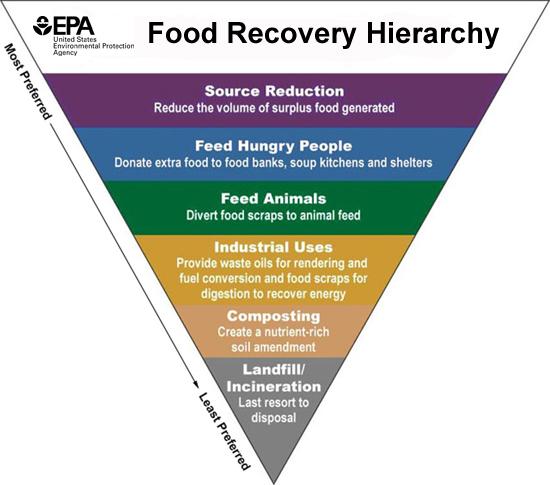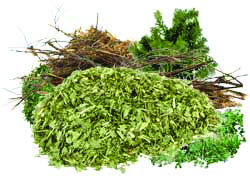 Green Waste
Green Waste
Recyclable Green Waste Includes
- grass clippings
- brush
- weeds
- hedge trimmings
- branches
- leaves
- palm fronds
- ice plant
- ivy
- flowers
- Halloween pumpkins
- Christmas trees (flocked trees are OK)
- untreated and non-lead based painted wood
Place recyclable green waste directly into your designated green collection container. NO Plastic bags, please.
Please do not place any of the following materials in your designated green waste recycling container:
- No plastic bags.
- No kitchen scraps, fruit, trash or hazardous waste.
- No animal waste.
- No dirt, rocks, asphalt, concrete, sand, etc.
- No treated or lead-based painted wood or lumber.
What Happens to Green Waste?
Green waste is used in a variety of diversion programs, including but not limited to land application and composting. The City receives diversion credit for both ADC and composting.Composting & Grasscycling…Natures Way to Recycle
EDCO promotes recycling…Naturally! And what could be more natural than to recycle yard waste in a composting bin or reduce waste by “grasscycling” lawn trimmings?
Composting is the natural decomposition of organic material into a soil product. Those who compost their own yard waste (hedge trimmings, flowers, grass, leaves, etc.) and certain kitchen scraps such as fruits, vegetables, coffee grounds and egg shells, can produce their own soil amendment or mulch for use on their landscape. Compost-amended soil provides a more nurturing medium for
plants therefore creating healthier landscaping that will be more resistant to disease and infestation.
Grasscycling is simply the practice of leaving grass clippings on the lawn after mowing. Grass clippings decompose quickly and return valuable nutrients, such as nitrogen, back into the soil. For best results, ask your landscaper, if applicable, to follow these simple guidelines:
- Mow the lawn when the grass is dry.
- Keep the blade of your lawn mower sharp.
- Follow the “1/3 Rule:” cut the lawn frequently enough so that not more than 1/3 of the grass blade length is trimmed each time you mow.
AB 827 - California’s Commercial Recycling and Organics (Green Waste) Container Mandate
Effective July 1, 2020, MCR and MORe covered businesses must provide organics and recycling containers for customers to collect waste generated from products purchased and consumed on the premises (AB 827, McCarty). These containers must be placed adjacent to trash and be visible, easily accessible, and clearly marked.
AB 827 requirements were added to existing AB 341 and AB 1826 requirements. The new law, passed in 2019, builds off existing requirements under these two laws.
- This law targets businesses that sell products meant for immediate consumption.
- Full-service restaurants do not have to provide properly labeled containers for patrons, but must provide properly labeled containers next to trash containers for employees to separate recyclables and organics for customers.
AB 1826 - California’s Commercial and Multi-Family Recycling Mandate
In October of 2014 California adopted Assembly Bill 1826, requiring all businesses to recycle their organic waste beginning April 1, 2016. The phase-in of this mandate helps California to achieve its overall waste diversion (75% by 2020) and greenhouse gas emission reduction goals.
Requirements for Businesses: Businesses, including public entities, that generate organic waste (food or green waste) are required to arrange for organic waste recycling services. See Implementation Dates below.
Business Organic Waste Includes:
• Food, including but not limited to: fruit, vegetables, cheese, meat, bones, poultry, seafood, bread, rice, and pasta; coffee filters, tea bags, cut flowers and herbs.
• Green Waste, including but not limited to: grass clippings, brush, weeds, hedge trimmings, leaves, palm fronds, ice plant, ivy and nonhazardous wood, like branches, untreated wood and clean wood waste.
• Compostable Paper, including but not limited to: uncoated paper that is soiled with liquid or solid food waste, like napkins, paper towels and tissues, paper plates, and paper cups.
Requirements for Multi-family Properties: Multi-family properties of 5 units or more are required to arrange for organic waste recycling services.
Multi-family Organic Waste Includes:
• Green Waste, including but not limited to: grass clippings, brush, weeds, hedge trimmings, leaves, palm fronds, ice plant, ivy and nonhazardous wood, like branches, untreated wood and clean wood waste.
Implementation Dates:
April 1, 2016, Businesses generating 8 cubic yards per week of organics and multi-family properties of 5 units or more shall arrange for organics recycling service.
January 1, 2017, Businesses generating 4 cubic yards per week of organics shall arrange for organics recycling service.
January 1, 2019, Businesses generating 4 cubic yards of commercial solid waste shall arrange for organics recycling service.
Assembly Bill (AB) 1826 requires all businesses, public entities, and multifamily dwellings with five (5) units or more, that generate four (4) cubic yards of commercial solid waste per week, to arrange for organics recycling service. The definition of commercial solid waste was further clarified through AB 1398 and includes the total amount of trash, recycling, and organics generated on a weekly basis.
EDCO can conduct free on-site visits to help businesses and multifamily properties comply with the state’s mandatory recycling requirements. Contact our Customer Service office by phone or submit a fast and easy online request by filling out the form under the Contact EDCO tab above to arrange for organic waste recycling services.
Currently in San Diego County, there is adequate capacity for recycling landscape and clean wood; however, the infrastructure needed to meet the demand for diverting all food waste is still under development. Therefore, we will be working closely with food waste generating customers through the following tiered approach:
• Prevention of Food Waste: First and foremost this helps your business improve your bottom line.
• Donation of Edible Food: Nearly one in seven San Diego County residents (approximately 500,000 people annually) do not know where their next meal is coming from. Regionally, almost 500,000 tons of food waste is sent to the landfill. EDI can assist you in setting up systems to donate food to help end hunger throughout San Diego County.
• Collection of Non-Edible Food: After all possible means of food waste prevention and donation of edible food have been pursued, remaining food waste material will be collected for recycling.
Food Waste Prevention
Click here for information on a local Food Rescue Program and Food Bank.
In the United States alone, a shockingly 40% of food is uneaten, wasted and thrown out. This results in an unfortunate misuse of resources needed to grow, process and transport food while wasting money and accelerating climate changes. We as consumers are the largest producers of food waste, believe it or not, exceeding the grocery stores and restaurants combined! So, the smallest changes we make add up and make a huge difference. Preventing food waste in the first place typically offers the most significant financial and environmental benefits. Below are some food waste prevention tips from Save The Food:
- Shop wisely: Plan your meals for the week in advance. Shop with a list. Stick to the list and avoid impulse buys.

- Proper portions: Don’t buy or serve more than you need.
- Love your leftovers: While you’re planning your meals, prepare for nights when you’re likely to go out to eat and when you might have leftovers from earlier meals. Get creative to give leftovers another life. They are the start of a casserole or soup the day after.
- Freeze it: Frozen food will keep longer. Almost anything can be frozen! But portion out, label and date your food so that it’s easy to serve later.
- Shop your kitchen before the store: Check the fridge, freezer, and pantry for items that need to get used up before you splurge on new things.
- Don’t fall for date labels: Food doesn’t immediately spoil as soon as the date on the package has passed. Sell-by, use-by, and best-by dates are generally manufacturers’ suggestions for when an item is likely to be at its peak quality.
- Spread the word: Engage friends, family, community, and businesses in food-saving practices. Share your favorite tips with your friends and family. Encourage your local restaurants and grocery stores to avoid excessive portions and package sizes, and tell them it is ok if they run out of an item at the end of the day (so that they can avoid over-purchasing). Teach kids to value food and not to waste it.

Your Service Area
You are currently viewing services for Corporate
Enter a zip code if you want to switch to another location.

